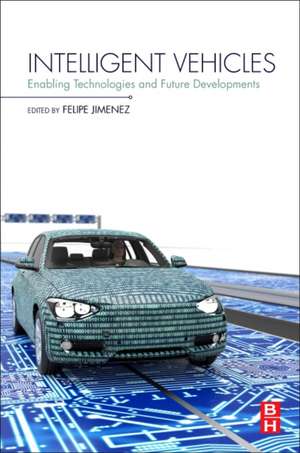Intelligent Vehicles: Enabling Technologies and Future Developments
Editat de Felipe Jiménezen Limba Engleză Paperback – 12 sep 2017
Intelligent road vehicles are becoming a challenging area of research worldwide. Apart from the final applications and systems in vehicles, there are many enabling technologies that should be introduced. Communications and automation are two key areas for future automobiles. This book benefits from collaboration on the Thematic Network on Intelligent Vehicles led by Felipe Jimenez.
- Provides a general overview of different aspects related to intelligent road vehicles (sensors, applications, communications, automation, human factors, etc.)
- Addresses the different components and building blocks of intelligent vehicles in a single, comprehensive reference
- Explains how sensors are interpreted, including how different sensor readings are fused
- Addresses issues involved with avoiding collisions and other factors such as pot holes, unclear road lines or markings, and unexpected weather conditions
Preț: 555.22 lei
Preț vechi: 729.57 lei
-24% Nou
Puncte Express: 833
Preț estimativ în valută:
106.25€ • 110.26$ • 88.81£
106.25€ • 110.26$ • 88.81£
Carte tipărită la comandă
Livrare economică 10-24 martie
Preluare comenzi: 021 569.72.76
Specificații
ISBN-13: 9780128128008
ISBN-10: 0128128003
Pagini: 504
Dimensiuni: 152 x 229 x 33 mm
Greutate: 0.73 kg
Editura: ELSEVIER SCIENCE
ISBN-10: 0128128003
Pagini: 504
Dimensiuni: 152 x 229 x 33 mm
Greutate: 0.73 kg
Editura: ELSEVIER SCIENCE
Public țintă
Researchers, MsC and PhD studentsCuprins
1. Introduction
Part A: Enabling technologies
2. Environmental Perception for Intelligent Vehicles
3. Vehicular communications
4. Positioning and digital maps
5. Big data in road transportation and mobility research
Part B: Application
6. Assistance and safety systems
7. Cooperative systems
8. Autonomous driving
Part C: Additional aspects
9. Human factor
10. Simulation tools
11. Social and economic impacts of intelligent vehicles
12. Future perspectives and work areas
Part A: Enabling technologies
2. Environmental Perception for Intelligent Vehicles
3. Vehicular communications
4. Positioning and digital maps
5. Big data in road transportation and mobility research
Part B: Application
6. Assistance and safety systems
7. Cooperative systems
8. Autonomous driving
Part C: Additional aspects
9. Human factor
10. Simulation tools
11. Social and economic impacts of intelligent vehicles
12. Future perspectives and work areas
